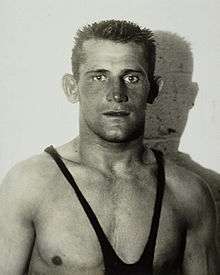Voldemar Väli
 Voldemar Väli at the 1928 Olympics | ||||||||||||||||||||||||||||
| Personal information | ||||||||||||||||||||||||||||
|---|---|---|---|---|---|---|---|---|---|---|---|---|---|---|---|---|---|---|---|---|---|---|---|---|---|---|---|---|
| Born |
10 January 1903 Kuressaare, Estonia | |||||||||||||||||||||||||||
| Died |
13 April 1997 (aged 94) Stockholm, Sweden | |||||||||||||||||||||||||||
| Sport | ||||||||||||||||||||||||||||
| Sport | Greco-Roman wrestling | |||||||||||||||||||||||||||
Medal record
| ||||||||||||||||||||||||||||
Voldemar Väli (10 January 1903 – 13 April 1997) was an Estonian two-time Olympic medalist in Greco-Roman wrestling.[1]
Väli started training in wrestling at age 17, and four years later competed at the 1924 Olympics, but was eliminated in a preliminary bout. In 1926 he won his first European title and established himself as a world top featherweight and later lightweight wrestler. He missed the 1932 Olympics because Estonia did not send a team due to the Great Depression, and finished out of the podium at the 1933, 1934, 1937 and 1938 European Championships; however, he earned a bronze at the 1936 Olympics.[2] Domestically he won 19 titles between 1922 and 1942 in Greco-Roman and freestyle events. During World War II in 1944 he emigrated with family to Sweden.[1][3] He ended his sporting career in 1945 after a match between the local Estonians and the team from Stockholm. He beat the Swedish champion Einar Karlsson.
Väli worked a crane operator at the Port of Tallinn.[1] In Sweden, he was a metal worker and later established a doll factory with his wife.[1]
References
- 1 2 3 4 "Voldemar Väli". sports-reference.com.
- ↑ Vaeli, Voldemar (EST). iat.uni-leipzig.de
- ↑ Väli, Voldemar. Eesti spordi biograafiline leksikon
External links
| Wikimedia Commons has media related to Voldemar Väli. |